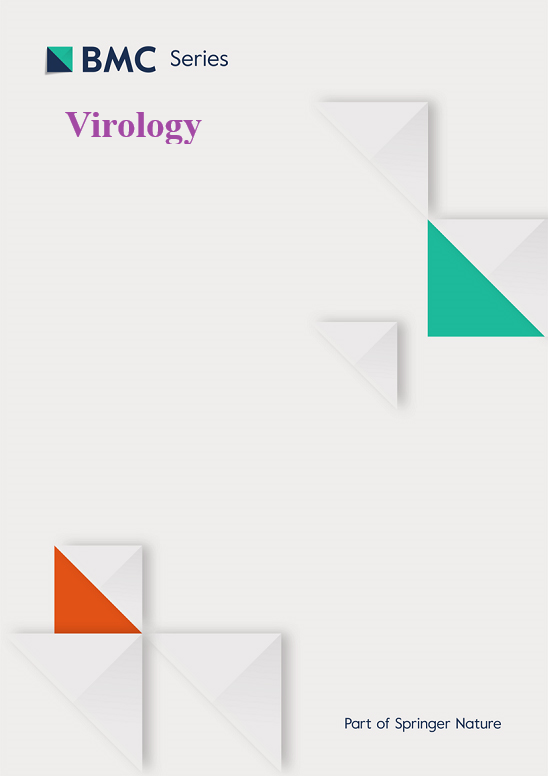细菌病原体联合感染和PRRSV-2基因修饰抑制NF-κB和减弱促炎反应
IF 2.8
3区 医学
Q3 VIROLOGY
引用次数: 0
摘要
猪繁殖与呼吸综合征病毒(PRRSV)感染肺泡巨噬细胞并诱导呼吸系统炎症。在养猪场,PRRSV和细菌病原体的共同感染很常见,可导致临床复杂的结果,包括猪呼吸道疾病。共感染可引起促炎介质的过度表达,并可能导致细胞因子风暴样综合征。PRRSV-2的一个免疫学标志是通过核衣壳蛋白(N)双向调节NF-κB,核衣壳蛋白被鉴定为NF-κB激活剂。我们通过突变N基因以阻断其与PIAS1(活化STAT-1的蛋白抑制剂(信号传感器和转录激活因子1)的结合,产生了NF-κ b沉默突变体PRRSV-2。PIAS1作为NF-κB抑制因子,因此,PIAS1结合修饰的n突变型PRRSV-2在表型上具有NF-κB活化抗性。猪同时感染PRRSV-2和猪链球菌时,n突变型PRRSV-2的促炎细胞因子表达降低,临床表现为衰减。本文综述了猪与多种病原体的共感染,抑制NF-κB的PRRSV突变体的产生,细菌共感染期间的炎症特征,以及这些发现在设计新的PRRSV-2候选疫苗中的潜在应用。本文章由计算机程序翻译,如有差异,请以英文原文为准。
Coinfection with bacterial pathogens and genetic modification of PRRSV-2 for suppression of NF-κB and attenuation of proinflammatory responses
Porcine reproductive and respiratory syndrome virus (PRRSV) infects pulmonary alveolar macrophages and induces inflammation in the respiratory system. In swine farms, coinfection with PRRSV and bacterial pathogens is common and can result in clinically complicated outcomes, including porcine respiratory disease complex. Coinfection can cause excessive expressions of proinflammatory mediators and may lead to cytokine-storm-like syndrome. An immunological hallmark of PRRSV-2 is the bidirectional regulation of NF-κB with the nucleocapsid (N) protein identified as the NF-κB activator. We generated an NF-κB-silencing mutant PRRSV-2 by mutating the N gene to block its binding to PIAS1 [protein inhibitor of activated STAT-1 (signal transducer and activator of transcription 1)]. PIAS1 functions as an NF-κB repressor, and thus, the PIAS1-binding modified N-mutant PRRSV-2 became NF-κB activation-resistant in its phenotype. During coinfection of pigs with PRRSV-2 and Streptococcus suis, the N-mutant PRRSV-2 decreased the expression of proinflammatory cytokines and showed clinical attenuation. This review describes the coinfection of pigs with various pathogens, the generation of mutant PRRSV for NF-κB suppression, inflammatory profiles during bacterial coinfection, and the potential application of these findings to designing a new vaccine candidate for PRRSV-2.
求助全文
通过发布文献求助,成功后即可免费获取论文全文。
去求助
来源期刊

Virology
医学-病毒学
CiteScore
6.00
自引率
0.00%
发文量
157
审稿时长
50 days
期刊介绍:
Launched in 1955, Virology is a broad and inclusive journal that welcomes submissions on all aspects of virology including plant, animal, microbial and human viruses. The journal publishes basic research as well as pre-clinical and clinical studies of vaccines, anti-viral drugs and their development, anti-viral therapies, and computational studies of virus infections. Any submission that is of broad interest to the community of virologists/vaccinologists and reporting scientifically accurate and valuable research will be considered for publication, including negative findings and multidisciplinary work.Virology is open to reviews, research manuscripts, short communication, registered reports as well as follow-up manuscripts.
 求助内容:
求助内容: 应助结果提醒方式:
应助结果提醒方式:


